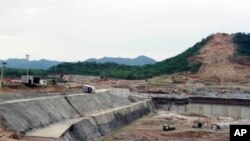A top Sudanese general on Sunday said his country would mediate a deal on an escalating dispute between Ethiopia and Egypt over Ethiopia’s controversial dam on the Nile River.
The deputy head of Sudan’s Sovereign Council, Mohamed Hamdan Dagalo, said his country would work to bridge the gap and “reach an agreement” in the years-long dispute.
Tensions are rising in east Africa because of the impasse between Ethiopia and Egypt over the $4.6 billion Grand Ethiopian Renaissance Dam. It’s around 71% complete and promises to provide much-needed electricity to Ethiopia’s 100 million people. Egypt fears the project — set to be Africa’s largest hydraulic dam — could reduce its share of the Nile, the main source of freshwater for Egypt’s population, also more than 100 million people.
Dagalo’s remarks, which were carried by Egypt’s official news agency Sunday, came at the end of two-day visit to Cairo where he met Egyptian President Abdel Fattah el-Sissi. Sudan sits between the Egypt and Ethiopia along the Nile’s route.
There has been public disagreement between Cairo and Addis Ababa after Ethiopia did not attend the latest round of talks over the dam on Feb. 26 in Washington. Ethiopia said it didn’t go because it needed further domestic consultations before signing a deal with Egypt.
The U.S. had crafted a draft deal after more than four months of talks on the filling and operation of the dam, and said the final testing and filling of the dam “should not take place without an agreement.” Egyptian officials have raised concerns that filing the reservoir behind the dam too quickly could significantly reduce the amount of Nile water available to Egypt.
Egypt signed the draft and urged Ethiopia and Sudan to do the same, describing it as “fair and equitable” and in the “common interest of the three countries.”
Ethiopia dismissed the deal, and is now drafting its own proposal on how to resolve the standoff, which will be presented to Egypt and Sudan soon, Ethiopia’s Foreign Minister Gedu Andargachew said in an interview with The Associated Press last week.
Ethiopia claims that President Donald Trump, who enjoys a warm relationship with el-Sissi, is favoring Egypt in the dispute.
The deadlock over the dam became increasingly bitter in recent weeks, with Egypt saying it would use “all available means” to defend “the interests” of its people.
Last week, Ethiopia’s top military officers visited the site of the dam and issued a statement vowing to “retaliate if there are any attacks on the dam,” a veiled warning to Egypt not to try to sabotage the structure.
Sudan’s government has been largely in disarray following the overthrow of President Omar al-Bashir last year, and its infrastructure has suffered from decades of sanctions. It’s currently ruled by a joint military-civilian government that has promised to hold elections in three years.




